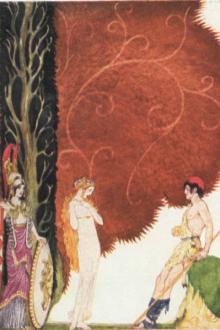The Adventures of Odysseus and The Tales of Troy - Padraic Colum (i read books .txt) 📗

- Author: Padraic Colum
- Performer: -
Book online «The Adventures of Odysseus and The Tales of Troy - Padraic Colum (i read books .txt) 📗». Author Padraic Colum
e said all this as he came up to them with his flock of goats. And as he went by he gave a kick to Odysseus.
Odysseus took thought whether he should strike the fellow with his staff or fling him upon the ground. But in the end he hardened his heart to endure the insult, and let the goatherd go on his way. But turning to the altar that was by the spring, he prayed:
'Nymphs of the Well! If ever Odysseus made offerings to you, fulfil for me this wish—that he—even Odysseus—may come to his own home, and have power to chastise the insolence that gathers around his house.'
They journeyed on, and when they came near they heard the sound of the lyre within the house. The wooers were now feasting, and Phemius the minstrel was singing to them. And when Odysseus came before his own house, he caught the swineherd by the hand suddenly and with a hard grip, and he said:
'Lo now, I who have wandered in many lands and have walked in pain through many Cities have come at last to the house of Odysseus. There it is, standing as of old, with building beyond building; with its walls and its battlements; its courts and its doors. The house of Odysseus, verily! And lo! unwelcome men keep revel within it, and the smoke of their feast rises up and the sound of the lyre is heard playing for them.'
Said Eumæus, 'What wilt thou have me do for thee, friend? Shall I bring thee into the hall and before the company of wooers, whilst I remain here, or wouldst thou have me go in before thee?'
'I would have thee go in before me,' Odysseus said.
Now as they went through the courtyard a thing happened that dashed Odysseus' eyes with tears. A hound lay in the dirt of the yard, a hound that was very old. All uncared for he lay in the dirt, old and feeble. But he had been a famous hound, and Odysseus himself had trained him before he went to the wars of Troy. Argos was his name. Now as Odysseus came near, the hound Argos knew him, and stood up before him and whined and dropped his ears, but had no strength to come near him. Odysseus knew the hound and stopped and gazed at him. 'A good hound lies there,' said he to Eumæus, 'once, I think, he was so swift that no beast in the deep places of the wood could flee from him.' Then he went on, and the hound Argos lay down in the dirt of the yard, and that same day the life passed from him.
Behind Eumæus, the swineherd, he came into his own hall, in the appearance of a beggar, wretchedly clad and leaning on an old man's staff. Odysseus looked upon the young lords who wooed his wife, and then he sat down upon the threshold and went no further into the hall.
Telemachus was there. Seeing Eumæus he called to him and gave the swineherd bread and meat, and said, 'Take these, and give them to the stranger at the doorway, and tell him that he may go amongst the company and crave an alms from each.'
Odysseus ate whilst the minstrel was finishing his song. When it was finished he rose up, and went into the hall, craving an alms from each of the wooers.
Seeing him, Antinous, the most insolent of the wooers, cried out, 'O notorious swineherd, why didst thou bring this fellow here? Have we not enough vagabonds? Is it nothing to thee that worthless fellows come here and devour thy master's substance?'
Hearing such a speech from Antinous, Telemachus had to say, 'Antinous, I see that thou hast good care for me and mine. I marvel that thou hast such good care. But wouldst thou have me drive a stranger from the door? The gods forbid that I should do such a thing. Nay, Antinous. Give the stranger something for the sake of the house.'
'If all the company gives him as much as I, he will have something to keep him from beggary for a three months' space,' said Antinous, meaning by that that he would work some hurt upon the beggar.
Odysseus came before him. 'They say that thou art the noblest of all the wooers,' he said, 'and for that reason thou shouldst give me a better thing than any of the others have given me. Look upon me. I too had a house of mine own, and was accounted wealthy amongst men, and I had servants to wait upon me. And many a time would I make welcome the wanderer and give him something from my store.'
'Stand far away from my table, thou wretched fellow,' said Antinous.
Then said Odysseus, 'Thou hast beauty, lord Antinous, but thou hast not wisdom. Out of thine own house thou wouldst not give a grain of salt to a suppliant. And even whilst thou dost sit at another man's table thou dost not find it in thy heart to give something out of the plenty that is before thee.'
So Odysseus spoke and Antinous became terribly angered. He caught up a footstool, and with it he struck Odysseus in the back, at the base of the right shoulder. Such a blow would have knocked another man over, but Odysseus stood steadfast under it. He gave one look at Antinous, and then without a word he went over and sat down again upon the threshold.
Telemachus had in his heart a mighty rage for the stroke that had been given his father. But he let no tear fall from his eyes and he sat very still, brooding in his heart evil for the wooers. Odysseus, after a while, lifted his head and spoke:
'Wooers of the renowned queen,' he said, 'hear what the spirit within me bids me say to you. There is neither pain nor shame in the blow that a man may get in battle. But in the blow that Antinous has given me—a blow aimed at a beggar—there is pain and there is shame. And now I call upon that god who is the avenger of the insult to the poor, to bring, not a wedding to Antinous, but the issue of death.'
'Sit there and eat thy meat in quiet,' Antinous called out, 'or else thou wilt be dragged through the house by thy heels, and the flesh will be stripped off thy bones,'
And now the lady Penelope had come into the hall. Hearing that a stranger was there, she sent for Eumæus and bade the swineherd bring him to her, that she might question him as to what he had heard about Odysseus. Eumæus came and told him of Penelope's request. But Odysseus said, 'Eumæus, right willing am I to tell the truth about Odysseus to the fair and wise Penelope. But now I may not speak to her. Go to her and tell her that when the wooers have gone I will speak to her. And ask her to give me a seat near the fire, that I may sit and warm myself as I speak, for the clothes I wear are comfortless.'
As Eumæus gave the message to the lady Penelope, one who was there, Theoclymenus, the guest who had come in Telemachus' ship, said, 'O wife of the renowned Odysseus, be sure that thy lord will return to his house. As I came here on the ship of Telemachus, thy son, I saw a happening that is an omen of the return of Odysseus. A bird flew out on the right, a hawk. In his talons he held a dove, and plucked her and shed the feathers down on the ship. By that omen I know that the lord of this high house will return, and strike here in his anger.'
Penelope left the hall and went back to her own chamber. Next Eumæus went away to look after his swine. But still the wooers continued to feast, and still Odysseus sat in the guise of a beggar on the threshold of his own house.
XIhere was in Ithaka a common beggar; he was a most greedy fellow, and he was nicknamed Irus because he used to run errands for the servants of Odysseus' house. He came in the evening, and seeing a seeming beggar seated on the threshold, he flew into a rage and shouted at him:
'Get away from here, old fellow, lest you be dragged away by the hand or foot. Look you! The lords within the house are giving me the wink to turn you out. But I can't demean myself by touching the like of you. Get up now and go while I'm easy with you.'
Odysseus looked at the fellow and said, 'I have not harmed you in deed or word, and I do not grudge you anything of what you may get in this house. The threshold I sit on is wide enough for two of us.'
'What words this fellow has!' said Irus the beggar. 'He talks like an old sit-by-the-fire. I'll not waste more words on him. Get up now, heavy paunch, and strip for the fight, for I'm going to show all the lords that I can keep the door for them.'
'Do not provoke me,' said Odysseus. 'Old as I seem, I may be able to draw your blood.'
But Irus kept on shouting, 'I'll knock the teeth out of your jaws.' 'I'll trounce you.' Antinous, the most insolent of the wooers, saw the squabble, and he laughed to see the pair defying each other. 'Friends,' said he, 'the gods are good to us, and don't fail to send us amusement. The strange beggar and our own Irus are threatening each other. Let us see that they don't draw back from the fight. Let us match one against the other.'
ll the wooers trooped to the threshold and stood round the ragged men. Antinous thought of something to make the game more merry. 'There are two great puddings in the larder,' he said. 'Let us offer them for a prize to these pugilists. Come, Irus. Come, stranger. A choice of puddings for whichever of you wins the match. Aye, and more than that. Whoever wins shall have leave to eat every day in this hall, and no other beggar shall be let come near the house. Go to it now, ye mighty men.' All the wooers crowded round and clapped the men on to the fight.
Odysseus said, 'Friends, an old man like me cannot fight one who is younger and abler.'
But they cried to him, 'Go on, go on. Get into the fight or else take stripes upon your body,'
Then said Odysseus, 'Swear to me, all of you, that none of you will show favour to Irus nor deal me a foul blow,'
All the wooers cried out that none would favour Irus or deal his opponent a foul blow. And Telemachus, who was there, said, 'The man who strikes thee, stranger, will have to take reckoning from me.'
Straightway Odysseus girt up his rags. When his great arms and shoulders and thighs were seen, the wooers were amazed and Irus was frightened. He would have slipped away if Antinous had not caught him and said to him, 'You lubber, you! If you do not stand up before this man I will have you flung on my ship and sent over to King





Comments (0)